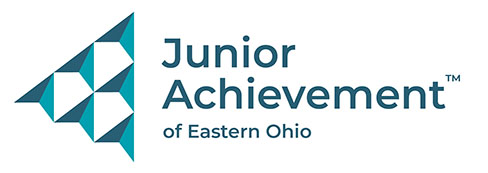The Junior Achievement office in Liberty Township has a new brand, logo and name to reflect the chapter’s growth over its 70 years of operation.
Junior Achievement of Eastern Ohio is the new name of the chapter. President Michele Merkel says the previous name, Junior Achievement of Mahoning Valley, didn’t include all four counties that it serves – Ashtabula, Columbiana, Mahoning and Trumbull – because Ashtabula is not a part of the Valley. The new name, she says, reflects all four equally.
With a new name comes a new logo. It’s the first change to the Junior Achievement logo since 1986, Merkel says. The update reflects the evolution of the organization from a supplemental youth development program in the 1980s to a fully integrated K-12 education partner today.
“The new logo, which resembles planes flying in formation or a flock of geese, borrows elements from the five previous JA logos. The new logo and branding represent how one leader in the community, working in tandem with Junior Achievement, can impact many lives,” Merkel says. “Ultimately, by working together, we can all rise above. Junior Achievement envisions a world where young people have the skill set and mindset to build thriving communities.”

Junior Achievement is a nonprofit organization that provides education programs in its three pillars: financial literacy, work and career readiness, and entrepreneurship. JA has nearly 100 programs for students K-12 that are taught by teachers and volunteers that include lessons like how to buy your first car and the difference between credit and debit cards.
JA had a prominent position in local schools until the pressure to perform on standardized tests caused some districts to pull back on nonmandatory programs. Merkel says the focus on standardized testing nearly phased JA out of school districts because of limited time.
Recent graduation requirements mandated by the Ohio Department of Education, however, have JA back in schools at full force. Under Ohio law, students entering 9th grade on or after July 1, 2022, must earn one-half credit of financial literacy to graduate. ODE also set standards to address financial literacy as early as kindergarten.
ODE realized that while students could pass tests, Merkel says, they struggled when they went to college or straight into the workforce.
“Yes, they can pass a test. But once they got to college, they could not complete college. Once they got into the workplace, they could not compete or maintain that work,” she says. “The ODE started to realize that more needs to be done at a younger age.”
JA had a 60-hour financial literacy curriculum in place with the potential to fulfill the ODE’S 60-hour financial literacy course graduation requirement.
The program, JA Financial Literacy, part of the JA High School Experience courses, is a one-semester, teacher-led course that equips students with foundational personal finance skills. These skills include how to earn and save money; manage money by being a wise consumer and creating and using a budget; manage bank accounts, investments, and credit; assess risks and how to use insurance; and address financial problems such as identity theft and debt.
With a few tweaks, thanks to a group effort from program director Jill Martin, the national JA office and other program directors, the curriculum was approved and ready for teachers this school year.
The new school year brings a sense of normality to JA after the pandemic forced the organization to pivot and transition to an online learning format. Merkel says the organization is thankful that it was able to stay in schools in some capacity but it doesn’t compare to in-person learning.
“It was great. Did we impact the same number of students that way? No,” she answers her own question. “While JA was ready to digitally deliver our programs and volunteer, our schools were not necessarily ready to do that.”

Before COVID, Merkel says, the organization served 15,000 students with nearly 600 community volunteers. Those numbers were cut in half during the pandemic. When the classrooms re-opened to volunteers, Merkel says the organization had a new problem.
“There were a lot of larger businesses that still had policies in place that didn’t allow their employees to go out and volunteer in their community, which hurt,” she says.
A $38.8 million donation this summer from philanthropist MacKenzie Scott to Junior Achievement USA is likely to aid the growth JA of Eastern Ohio is experiencing. Scott donated the money to the national organization and 26 local operations – the largest single gift in JA’s 103-year history. While the local office was not selected, Merkel describes herself as optimistic that the gift will benefit local students.
“I have been with Junior Achievement for 25 years and can personally say that our national office does an outstanding job in supporting area offices at no additional cost,” she says.
Laura Dewberry, director of the Center for Nonprofit Leadership at Youngstown State University and senior lecturer in YSU’s department of management and marketing, is a JA volunteer who is more than ready to return to the classroom. Dewberry is on the JA of Eastern Ohio board and is a regular classroom volunteer for fourth, fifth and seventh grades.
“There’s something about JA that is so special,“ she says. “I have volunteered a lot in my day and there is something magical about volunteering with JA because you feel like you have truly made a difference.”
JA has several programs that cater to a younger age group and make financial literacy easier to digest, Dewberry says.
One program, designed for 3rd, 4th and 5th graders, is JA More than Money. The program introduces students to financial literacy and entrepreneurship, and to social studies learning objectives that include money-management skills, goods and services, and global markets. Through hands-on activities and a JA cast of characters serving as symbols for financial literacy and entrepreneurship concepts, students learn a practical approach to starting a business and making smart decisions about managing money.
Dewberry says she has a soft spot for her 4th and 5th graders who she says love the program. She says JA is unique and doesn’t have a lecture-style format. The information is delivered through games and activities, so the students react well to it.
“They just can’t get enough of it. The curriculum for Junior Achievement is so well thought out that it’s like they are in the minds of whatever grade the lesson is for,” she says.
